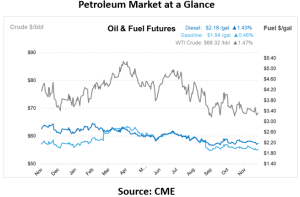
DEF Facts: What’s True, What’s False?
Diesel Exhaust Fluid (DEF) plays an important role in modern diesel engines by helping reduce harmful nitrogen oxide (NOx) emissions through Selective Catalytic Reduction (SCR) systems. However, some misinformation can lead to confusion among fleet owners and operators. It’s important to clear up these misconceptions to ensure the proper use and maintenance of DEF systems.
In today’s article, we’ll explore a series of statements about DEF and assess whether they are true or false. By clearly explaining each, we aim to clarify common misunderstandings about DEF and its impact on engine performance, maintenance, and emissions control.
- DEF (Diesel Exhaust Fluid) is a water and urea solution used in selective catalytic reduction (SCR) systems to reduce nitrogen oxide (NOx) emissions from diesel engines.
True. DEF is indeed a solution composed of 67.5% deionized water and 32.5% urea. It is used in SCR systems to significantly reduce NOx emissions from diesel engines, converting them into harmless nitrogen and water vapor through a chemical reaction. Learn more.
- Truck owners can decide whether to use DEF or not.
False. Truck owners must use DEF if their vehicle is equipped with a Selective Catalytic Reduction (SCR) system. Legislation, including U.S. Environmental Protection Agency (EPA) and California Air Resources Board (CARB) regulations, mandates the use of DEF in newer diesel engines to meet strict emissions standards. Trucks built after 2010, particularly those with SCR systems, are required to use DEF to reduce nitrogen oxide (NOx) emissions. If a truck is older and not equipped with SCR technology, DEF is not necessary, but for vehicles made after this time, failing to use DEF can lead to engine performance issues, including speed restrictions and potential shutdowns, in compliance with these regulations. Learn more.
- DEF needs to be refilled regularly.
True. DEF must be refilled regularly, typically alongside the refueling of your diesel tank. It is essential for emission control, and running low can affect vehicle performance. In extreme cases, an empty DEF tank may cause the engine to shut down. Always refer to your vehicle’s manual for specific refill guidelines.
- DEF requires a special catalyst to work. You can’t just spray it in the exhaust and expect it to work.
True. DEF requires a specific catalyst, generally part of the SCR system, to function correctly. Simply spraying DEF into the exhaust without this catalyst won’t reduce emissions. The SCR system is vital for the fluid to reduce NOx emissions effectively. Learn more.
- You can add DEF directly to your diesel tank.
False. DEF should never be added to the diesel tank, as it can cause severe damage to the engine and fuel system. DEF is formulated differently from diesel fuel and should only be added to its designated tank. If DEF accidentally contaminates the diesel tank, do not start the engine, and seek professional assistance immediately.
- When you use DEF, trucks suffer a reduced engine life span and lower fuel economy.
False. DEF, when used correctly, does not reduce engine life or fuel economy. In fact, it helps reduce harmful emissions without negatively impacting performance. By managing emissions, DEF helps keep the engine running efficiently.
- DEF formulas are very critical and sensitive to sunlight.
True. Exposure to sunlight can degrade DEF by breaking down the urea content, which shortens its shelf life and effectiveness. DEF should be stored in a shaded area, particularly if kept outdoors, to protect it from sunlight. Learn more.
- You can use additives for DEF in cold climates.
False. Adding solutions to DEF to raise its freezing point is not recommended. Maintaining the purity of DEF is essential for the SCR system to function properly. Introducing additives can impair its performance and damage the system.
- You can use heated blankets in your DEF storage to periodically warm and prevent it from freezing.
True. In very cold climates, heated blankets can be used around DEF storage tanks to prevent freezing. A 110v heater blanket can help maintain a stable temperature, ensuring the DEF remains in a usable state.
- If you have a SCR system and you run out of DEF, you’ve got problems.
True. Running out of diesel exhaust fluid can lead to serious issues. If you find yourself in this situation, it’s crucial to refill your supply promptly. Running empty on DEF can result in noticeable signs such as a significant decrease in vehicle speed, potential damage to the header, and the risk of clogging or malfunction in the exhaust system.
- The DEF system has nothing to do with the engine.
False. The DEF system is directly connected to the engine and specifically designed to reduce emissions from the diesel engine’s exhaust. DEF is injected into the exhaust system, where it reacts with hot gases to break down nitrogen oxides (NOx), harmful pollutants produced by diesel engines.
- DEF is a hazardous substance.
False. There’s a common misconception that mishandling it can lead to serious health problems. However, it is actually completely safe—it’s non-toxic, non-flammable, and non-hazardous. It’s perfectly safe for transport and poses no risk if it touches the skin.
Looking for a High-Quality DEF for your Fleet? Look no further!
Mansfield Energy understands the importance of protecting your fleet assets. Today’s high-tech diesel engines are expensive. Using poor quality, off-spec DEF can increase fuel consumption, equipment downtime, and maintenance expenses. Mansfield ensures customers always have a reliable supply of high-quality DEF that consistently meets ISO standards.
With our extensive network of DEF distribution partners combined with our own dedicated assets, Mansfield offers unmatched DEF logistics to ensure you always have the DEF you need. Contact us today!
DEF Equipment Catalog
Looking for the right equipment for your DEF needs? With Mansfield’s DEF Equipment Catalog, you can explore a variety of DEF equipment options and request information or purchase support directly. Check out our online catalog today!

This article is part of Daily Market News & Insights
MARKET CONDITION REPORT - DISCLAIMER
The information contained herein is derived from sources believed to be reliable; however, this information is not guaranteed as to its accuracy or completeness. Furthermore, no responsibility is assumed for use of this material and no express or implied warranties or guarantees are made. This material and any view or comment expressed herein are provided for informational purposes only and should not be construed in any way as an inducement or recommendation to buy or sell products, commodity futures or options contracts.





